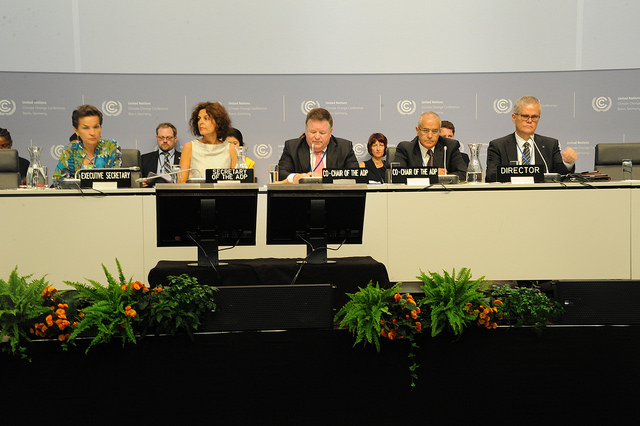
By Usman Inuwa
Preparations on the Road to Paris finally entered the final lap as negotiations under the UN Framework Convention on Climate Change (UNFCCC) opened this morning in Bonn, Germany, and will continue until 4 September 2015.
The tenth part of the second session of the Ad Hoc Working Group on the Durban Platform for Enhanced Action (ADP 2-10) began on the basis of the agenda adopted at ADP 2-1, structured around 2015 Agreement and pre-2020 ambition. The ADP’s task of developing the 2015 agreement will be based on the negotiating text adopted at ADP 2-8 in February 2015, called the Geneva negotiating text (GNT).
In their scenario note, ADP Co-Chairs Ahmed Djoghlaf (Algeria) and Daniel Reifsnyder (US) explained that they have prepared an additional tool for meeting, which includes a “fully streamlined, consolidated, clear and concise version of the GNT” that presents clear options and does not omit or delete any option or position of parties.
The tool places the various paragraphs of the Geneva Negotiating Text into three parts: provisions appropriate for inclusion in an agreement; provisions appropriate for inclusion in a decision; and provisions whose placement requires further clarity from parties.
The Co-Chairs indicate that at this Bonn meeting, parties will need to engage with each other on the substance of all provisions, and consider how to adjust and go beyond the initial suggested allocation.
For each provision, there are several alternatives on the table, many distinctly contradictory. Consequently the document containing all these, on all the provisions, is a humongous 83 pages of text in font size 8.
Concerns
Developing countries are unhappy with how the issues are balanced and will question whose interests benefit from the current categorization, as it is widely felt that the “tool” reflects developed country demands to include in Part 1 increased obligations for poorer developing counties, without carrying over previous legal obligations for developed countries to support developing country in dealing with climate impacts and grow cleanly through proposals on adaptation, finance, technology transfer.
The critical issue of loss and damage (i.e. support for those already being impacted by the climate crisis) has been confined to Parts 2 or 3, seen as the graveyard for the Paris text. Over the course of the week developing countries will attempt to move language on loss and damage and other issues from Parts 2 and 3 into Part 1, whilst developed countries are likely to resists these efforts.
Since the last negotiation session took place in June, July 2015 has gone down as the warmest in recorded history with deadly heatwaves in the Middle East and Indian subcontinent, intensified drought in California, and severe flooding across the African continent.
Public opinion across the globe has also reflected the urgent need for climate action as major climate declarations from Islamic Faith groups, the Papal Encyclical, and mass direct action in Germany to shut down the Rhineland coal fields have all combined to increase the pressure on the negotiators.
Civil society expectations
Civil society groups have previously called for developed countries to not only reduce their emissions 50% below 1990 levels by 2020, but to also articulate a pathway to meet the costs the developing countries will need to adapt to a warmer world and reduce their own emissions. However, only $2.5 billion has been pledged for the next 4 years and there remains no clear roadmap as to how that figure will be increased to the minimum threshold of $100 billion.
Furthermore, civil society groups from around the world have already set out their bare minimum for the Paris deal to be considered even remotely successful: a “People’s Climate Test” demands the agreement deliver justice for impacted people by recognising loss and damage, protects ecological food production, and serve a massive injection of finance into renewable energies in order to transform the energy system.
Towards a less-ambitious Paris?
So far the process of coming up with countries’ pledges to the Paris Summit, their “Intended Nationally Determined Contributions” or INDCs, has shown that developed countries are unwilling to provide support-there has been no mention of finance from them whatsoever, despite the decision from Lima saying that INDCs should cover more than just mitigation.
An analysis of the pledges coming in only diminishes the hope for Paris to be ambitious and equitable-many developing countries have indicated that much of their INDCS are conditional-i.e. they want to undertake ambitious action but need support in terms of finance and technology to deliver-but are now legitimately afraid that those pledges will be taken and treated as unconditional, thereby putting them under pressure to act without any support; or worse, that the support on offer may be new financial loans which could increase their debt burden.
“There is a lot of work to be done between now and Paris. It’s usually to the disadvantage of developing countries when political leaders are left to sit over a long list of unresolved differences in the small print at the last moment. Copenhagen is proof of that,” says an observer at the Bonn talks, wishing to remain anonymous.











